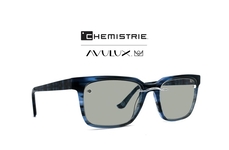
This Project Uses Augmented Reality to Educate People About Migraines
Rahul Kalvapalle — October 4, 2016 — Tech
References: itunes.apple & excedrin
The Migraine Experience is an high-tech education and public awareness project, launched by headache and migraine relief medication brand Excedrin, that makes use of Google Cardboard headsets to help people temporarily experience what it's like to suffer from migraine headaches.
Migraine sufferers can use the companion smartphone app to program in the unique migraine features that they regularly suffer from, whether it's light sensitivity, visual hallucinations or ear discomfort. They can then ask a family member or friend to wear the headset in order to experience what they live with on a daily basis.
The Migraine Experience is a great example of virtual reality technologies being leveraged to promote a degree of higher empathy among people unfamiliar with the realities of specific medical conditions, helping sufferers to better cope with their day-to-day struggle.
Migraine sufferers can use the companion smartphone app to program in the unique migraine features that they regularly suffer from, whether it's light sensitivity, visual hallucinations or ear discomfort. They can then ask a family member or friend to wear the headset in order to experience what they live with on a daily basis.
The Migraine Experience is a great example of virtual reality technologies being leveraged to promote a degree of higher empathy among people unfamiliar with the realities of specific medical conditions, helping sufferers to better cope with their day-to-day struggle.
Trend Themes
1. Virtual Reality Education - The Migraine Experience project demonstrates the potential of virtual reality technology in educating and sensitizing the public about medical conditions.
2. Mobile App Integration - By allowing the customization of unique migraine features, the Migraine Experience app provides a platform for creating personalized experiences and could inspire similar apps for other medical conditions.
3. Empathy Promotion - The use of virtual reality in the Migraine Experience helps promote empathy and understanding of neurological conditions and opens up markets for VR-based empathy training programs in other fields like mental health or social work.
Industry Implications
1. Healthcare - Virtual reality technology, such as that used in the Migraine Experience project, can open up new possibilities for healthcare education, treatment, and empathy training.
2. Pharmaceutical - Pharmaceutical companies, like Excedrin in the case of the Migraine Experience project, can benefit from immersive education and awareness projects that promote better treatment adherence and wider public understanding.
3. Education & Training - Virtual reality technology, like that used in the Migraine Experience project, can also offer novel solutions for empathy training in fields like mental health, social work, and other industries where increased empathy is a desired outcome.
4.9
Score
Popularity
Activity
Freshness























